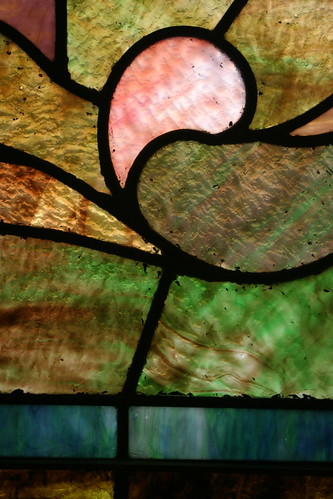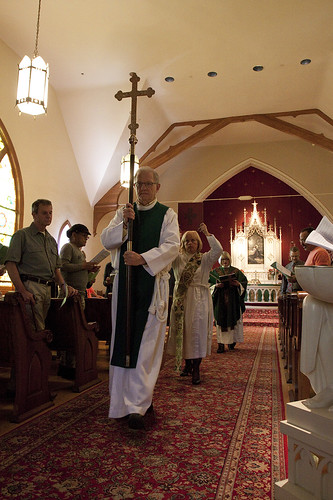What We Believe
 What do we believe?
What do we believe?
We believe that all people are children of God, who is the Creator of life.
We believe that the Christian church is made up of those who have been baptized and believe Jesus Christ as the Son of God and Savior of the world. Lutherans believe that they are a part of that community of faith which began with the gift of the Holy Spirit, God’s presence with his people, on the day of Pentecost.
The church, regardless of the external form it takes, is the gathering of those who believe in Christ. The church is essential to Christian life and growth. Its members are all people in need of God’s grace. It has no claim on human perfection. The church exists solely for the hearing and doing of what Jesus said and did.
Most Lutherans recognize a wider fellowship of churches and are eager to work alongside them in ecumenical and interfaith projects.
Why a Lutheran church?
Martin Luther (b. November 10, 1483, in Eisleben, Germany, d. February 18, 1546 in Eisleben) is known as the founder of Protestantism. He had planned to become a lawyer, but a spiritual experience changed his plans, and he became, instead, an Augustinian monk in 1505. He was ordained a priest in 1507.
While serving as a pastor and professor of theology, he discovered significant differences between what he read in the Bible and the theology and practices of the church. On October 31, 1517, he posted a challenge on the church door at Wittenberg University to debate 95 theological issues.
Luther’s hope was that the church would reform its practice and preaching to be more consistent with the Word of God as contained in the Bible. What started as an academic debate escalated into a religious war, fueled by fiery temperaments and violent language on both sides. As a result, there was not a reformation of the church but a separation. “Lutheran” was a name applied to Luther and his followers as an insult but adopted as a badge of honor by them instead.
Lutherans still celebrate the Reformation on October 31 and still hold to the basic principles of theology and practice espoused by Luther, such as Sola Gratia, Sola Fide, Sola Scriptura: We are saved by the grace of God alone — not by anything we do; Our salvation is through faith alone — we only need to believe that our sins are forgiven for Christ’s sake, who died to redeem us; The Bible is the only norm of doctrine and life — the only true standard by which teachings and doctrines are to be judged.
Many Lutherans still consider themselves as a reforming movement within the Church catholic, rather than a separatist movement, and Lutherans have engaged in ecumenical dialogue with other church bodies for decades. Luther’s Small Catechism is still used today to introduce people to the Lutheran faith, as is the Augsburg Confession.
St Francis Lutheran Church Perseveres
On January 1, 1996, St. Francis Lutheran Church was expelled from the Evangelical Lutheran Church of America (ELCA), along with First United Lutheran Church of San Francisco, because we violated a provision of the ELCA constitution.
In January, 1990, the two congregations called and ordained a gay man and a lesbian couple, graduates of Lutheran seminaries, who were not approved for ordination by the ELCA solely because they refused to pledge lifelong abstinence from sexual relations. We believe that gay people are as much a part of the Body of Christ as anyone else.
In the face of this judgment against us, we, along with our companion congregations, continued to stand by our decision, and continued to celebrate our diversity as part of our everyday journey with Christ. A non-profit, Lutheran Lesbian and Gay Ministries (now ELM.ORG), was started by a number of members of St Francis to respond to the exclusiveness of the ELCA.
Since that time, the ELCA has re-examined their constitution, and voted to make key changes in 2010. These changes were more friendly to lesbian, gay and transgender clergy, and allowed them to join the ELCA as clergy. As a result St. Francis voted to re-join the Sierrra Pacific Synod, and was officially restored back into the ELCA on February 27, 2011.
Who was St. Francis?
Saint Francis of Assisi (b. 1182; d. 4 Oct 1226) was the son of a wealthy Italian nobleman. Distressed by the wealth and hypocrisy of the church of his day, he vowed a radical poverty that attracted other spiritually alienated men and women, and founded the Franciscan religious order. This excerpt from Valerie Martin’s 1999 biography provides a rich introduction to the character of this saint. This review of K.B. Wolf’s 2003 book “The Poverty of Riches” contains an interesting dissenting view. And this entry from the Catholic Encyclopedia gives a conventional view.
San Francisco, Calif., one of many cities around the world named for this saint, was founded by members of the Franciscan order in the 18th century. St. Francis Lutheran is the only Lutheran church in the U.S. to be named for St. Francis.
The text of portions of this page was adapted from “What Lutherans Believe,” published by Evangelical Outreach, Division for Parish Services of the former Lutheran Church in America.
We are a congregation of the Evangelical Lutheran Church of America (ELCA) the largest Lutheran body in the U.S. Our worship is like that of most Lutheran churches in the country, though we use a wider range of sources for hymns and liturgical music than many, and we use gender-inclusive language throughout our worship service. Find out more about the way we worship.
Worship

We celebrate Holy Communion, or the “Eucharist,” every Sunday morning at 11:00.
The Eucharist has two main parts, proclamation of the word, or message, and celebration of the holy meal we share with saints of every time and place, in which we receive the very substance of Christ. The Word and the Meal are bracketed by a Gathering rite, wherein God gathers us together, and a Sending rite, wherein God sends us out into the world to care for all people, and all of God’s beloved creation.
At St. Francis, our worship reflects the radical love and inclusivity we experience in relationship with God in Christ. Our worship language is gender‐inclusive. All are welcome at God’s table.
Links To Other Organizations
Evangelical Lutheran Church in America
Extraordinary Lutheran Ministries
ReconcilingWorks (previously Lutherans Concerned/North America)
lcsanfrancisco.org (bay area organization of ReconcilingWorks)
Copyright © 2021 - St. Francis Lutheran Church - All rights reserved. Site designed by Two Creative Guys. Photography: Patrick Power and St. Francis Lutheran Church
